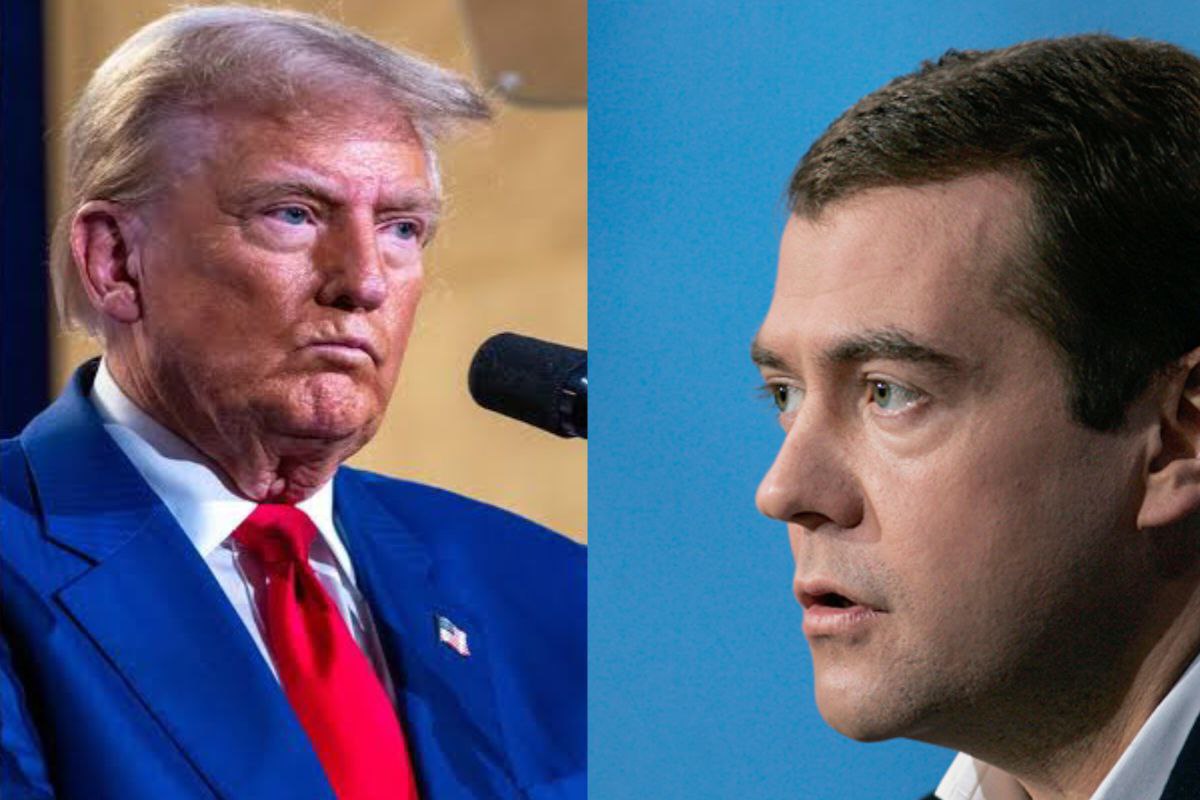A fiery exchange between U.S. President Donald Trump and former Russian President Dmitry Medvedev has reignited Cold War-style tensions. From nuclear threats to personal insults, the verbal crossfire signals a dangerous shift in U.S.-Russia relations. Is the world witnessing the beginning of Cold War 2.0?
Cold War 2.0 Begins?
Tensions between the United States and Russia have surged dramatically in recent days after a fierce and unusually personal exchange between U.S. President Donald Trump and former Russian President Dmitry Medvedev. The verbal conflict, which played out across social media platforms and international news headlines, is the latest sign of a broader breakdown in diplomacy between the two nuclear superpowers. Many analysts now fear this war of words is a signal that Cold War 2.0 may already be underway.
At the center of this dispute is an ultimatum that President Trump allegedly gave to Russia, setting a time limit of either 50 or 10 days for the Kremlin to take steps toward ending the ongoing conflict with Ukraine. Though details remain vague, the message was widely perceived as a thinly veiled threat.
Medvedev, now serving as the Deputy Chair of the Russian Security Council, fired back with sharp words and a heavy dose of sarcasm. He warned President Trump against issuing ultimatums to a country like Russia, saying: “Trump should remember two things: Russia isn’t Israel or even Iran. And each new ultimatum is a threat and a step towards war—not between Russia and Ukraine, but with his own country. Don’t go down the Sleepy Joe road!”
The message was as much a jab at President Trump as it was at former President Joe Biden, whom Medvedev accused of following a path of reckless escalation with Russia. Medvedev’s language suggested that any U.S. attempt to pressure Moscow would result in greater conflict, not resolution. The former Russian leader’s choice of words drew immediate international attention for its aggressive tone.

Trump responded on his social media platform, Truth Social, with a blunt and hostile statement: “Russia and the USA do almost no business together. Let’s keep it that way, and tell Medvedev, the failed former President of Russia, who thinks he’s still President, to watch his words. He’s entering very dangerous territory!”
The back-and-forth quickly caught the attention of U.S. political leaders. Among them was Senator Lindsey Graham, a well-known defense hawk and staunch Trump ally. He issued a warning to Russia, saying: “To those in Russia who believe that President Trump is not serious about ending the bloodbath between Russia and Ukraine: You and your customers will soon be sadly mistaken. You will also soon see that Joe Biden is no longer president. Get to the peace table.”
Senator Graham’s statement underscored a broader message being pushed by the Trump administration: that the old diplomatic rules have changed and that the United States under Trump will not tolerate prolonged instability in Eastern Europe, especially one funded and fueled by the Kremlin.
Medvedev, however, was not done. His next message was even more cutting. He dismissed Graham’s statement entirely and attacked both Trump and American foreign policy: “It’s not for you or Trump to dictate when to ‘get at the peace table’. Negotiations will end when all the objectives of our military operation have been achieved. Work on America first, gramps!”
The personal tone of “gramps” was clearly aimed at mocking the age of American political leadership and undermining its credibility. But Medvedev saved his most chilling comments for last. Responding to Trump’s previous post, he said: “About Trump’s threats against me on his personal ‘Truth’ social media network, which he’s banned in our country—if some words from the former president of Russia trigger such a nervous reaction from the high-and-mighty president of the United States, then Russia is doing everything right and will continue to proceed along its own path.”
He went even further, referencing a dormant but terrifying Cold War relic: “And about India’s and Russia’s ‘dead economies’ and ‘entering very dangerous territory’ – well, let him remember his favorite movies about ‘The Walking Dead’, as well as how dangerous the fabled ‘Dead Hand’ can be.”
The “Dead Hand” or “Perimeter” system was a Cold War-era Soviet nuclear deterrent, designed to automatically launch retaliatory strikes even if Russian leadership was incapacitated. By referencing it now, Medvedev escalated the rhetoric to nuclear levels—a chilling reminder of the stakes involved in U.S.-Russia relations.
So what does all this mean for global stability?
First, this marks a clear shift in tone from both Washington and Moscow. No longer confined to cautious diplomatic statements, leaders from both sides are resorting to insults and open threats. Second, it shows that the Ukraine conflict is now less about Kyiv and more about the geopolitical chessboard between the world’s two most heavily armed nations.
There is also the underlying narrative of U.S. domestic politics bleeding into foreign policy. Medvedev’s repeated jabs at both Trump and Biden suggest that Moscow sees U.S. political divisions as an opportunity to destabilize American influence globally. Meanwhile, Trump’s own fiery rhetoric appears designed to project strength and draw contrast with the Biden administration’s more measured, if less impactful, foreign policy.
Furthermore, Adding Fuel to this Cold War, the mention of India and Russia’s economies by Trump—presumably labeling them as “dead”—indicates that the dispute is no longer confined to military or political matters but is now extending into economic narratives and trade. raises the question: are we sliding into a new Cold War?
As of now, this cold war is still one of words. But words, especially in geopolitics, can have consequences. The invocation of nuclear concepts like Dead Hand, combined with ultimatums and dismissive insults, raises the question: are we sliding into a new Cold War?
Only time will tell. But for now, the verbal battles between Trump and Medvedev have turned into a serious diplomatic flashpoint—one the world cannot afford to ignore

